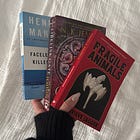why you should read books that are really hard to finish
enter the zone of growth (book experience #12)
Last week, I made a list of important book experiences to have in your lifetime.
Number twelve on that list was to finish a book that was really hard to finish. As someone struggling through Solenoid for the past six weeks, this was top of mind. There is a very large part of me that wants to give up now, 50% in. It challenges me in ways that seem silly for a “hobby,” and after a long day of work, a mindless crime thriller sounds more palatable.
So how do I also claim that it is important to finish books that are hard to finish? I am a firm believer in DNF’ing or NRN’ing1, so at what point do we determine to go ahead with a book we might be struggling with?
What I consider “hard to finish” is mostly challenging in a mental capacity, but could also be a book that brought up tough feelings or made you uncomfortable. These are often sticky experiences - they force you to reconcile what you think with what you now know, or see life in a new way. Sometimes the prose or syntax is challenging, or sometimes it’s the topic or themes. And it is because they are challenging and not in spite of that these titles often end up favorites. I know I’ve finished many books that made me squirm in my seat that I will now never forget and… think of fondly(!). Is this some kind of biological protection similar to how a mother forgets the pain of childbirth upon seeing the finished product?
Basically, we are talking about the zone of growth2. Remember this chart?!
I’ve updated the books a bit and highlighted the magic growth zone. These are the books that start out very low on the enjoyment scale in quadrant four and proceed to worm their way into your heart (and the highly desirable quadrant one). Not every book ends up that way, but I’ve found that if at least once per reading session I find a redeeming quality, it will be worth it to push through the discomfort and finish the really hard book.
Here are a few of the books that were really hard for me to finish, and why they are now long-term favorites (or at least live rent-free in my mind).
one that challenged my privilege
Salvage the Bones by Jesmyn Ward
This book is brutal. Beautiful, devastatingly poetic, layered thick with meaning, but seriously heartbreaking. You have to be strategic about how you ingest it.
It is about a poor black family living in the rural south and what happens when their community is hit by Hurricane Katrina. A deceased mother and alcoholic father compound the family's destitution. Add in natural disaster, dogfighting, and violence, and you have set the scene for misery. Yet there is hope and redemption in the midst of it all, thanks to the young narrator Esch, who is sweet and fierce. This one greatly challenged my sense of privilege to move through the world with a stable home life, clothed and fed. I will never look away from those communities that need support, or knowingly vote for someone who wants to deny aid to our most vulnerable populations again.
one that challenged my intelligence
Jonathan Strange & Mr Norrell by Susanna Clarke
Magic is gone from England. Enter Mr. Norrell. A weird little man whose fame stems from a single piece of magic. Drama amongst the learned ensues. Enter Jonathan Strange. A chaotic man full of suspicious magic. Then add two beautiful fairy princesses, a cast of lawless characters, and one big war, and you have this 900-page tomb summed up.
The minute I started this book, I was ready to give up. It takes a long time to get used to the 19th-century Dickensian English, to understand what Clarke is trying to do, to center yourself in this fictional world that is both real and surreal at once. It was hard to get into a flow state, even though it also had me in tears from the subtle digs or clever history rewrites. I had to really listen, clue into context and read closely. But by the end, I had found a new top ten book of all time, and the struggle was all worth it.
one that challenged my sense of reality
The Wind-Up Bird Chronicle by Haruki Murakami
Going into this book, the only thing I knew about Murakami was that many readers find his portrayal of women to be problematic. I was prepared to be irritated. This did not, in fact, happen. I found his supporting cast of female characters to be more intriguing than the passive male MC. This man loses his cat, then he loses his wife, then he loses his sanity. A bunch of weird people come into his life, he sits at the bottom of a well, and old men tell him war stories. He strangely accepts every unreality thrown his way.
What I was not prepared for was humans of both genders void of any passion, empty actors, instead motivated by trauma manifested in vaguely supernatural talent. No one's names are their names. Identity is fluid and stolen, morphed and challenged. Bodies are sometimes just bodies, removed from any psychic attachments. Fragments of objects appear across vignettes that make you question if you pull back that curtain, will the wizard really be just another politician...
Did I like this book? Sure I liked this book. I like it more the more I write about it. Was it also long and deep and confusing and truly terrifying? Yes, that too. It took me weeks to complete. Would I recommend this book? Perhaps, but not widely and resoundingly. I might ask you a series of questions, such as, how do you feel about ambiguity? Or what about a man skinned alive? Or what about characters named Nutmeg and Cinnamon and Creta Kano? Perhaps then you may be welcomed into the bottom of the well.
one that challenged my sense of self
The Idiot by Elif Batuman
Selin is a college freshman at Harvard in the 1990s, discovering email and boys with the same aplomb (which is zero). After falling in love with an older guy, Selin moves through classes and social situations with all the emotion and self-awareness of an alien from Mars.
Ideal growth quadrant stuff! It started way to the left, and inched its way right through humor and consultation. It still exists in my mind as a series of dichotomies: brilliantly written, not fun to read; genius and frustrating; funny but impassive. I laughed so hard and also had to force myself to come back to it each time. Some of this may be due to the circumstances in which it was read (in the summer, on a treadmill, mostly on my lunch break). If I had given it the old college try, I may have been able to sink deeper into Selin’s character. But what really challenged me was seeing all the ways Selin’s mistakes reflected my own at that age (and older) - the ways in which wanting to fit in, wanting attention, wanting to be seen, makes us do crazy things (like deciding to spend your summer teaching English to rural Hungarian kids). While I didn’t always understand Selin’s choices, I certainly saw my own behaviors reflected back to me. Second-hand embarrassment is powerful, my friends.
Even though each one of these books challenged me in different ways, I easily think about them more than the initial enjoyment warrants, and that’s how I know they were worth it.
let’s end with ten more book experiences
When I shared my book experiences and asked you to share yours, I was not let down! It may seem cheesy, but I genuinely love getting to know what you all read and care about. Here are the ones that you would add to the list.
a book that inspires you to change the course of your life (and you actually do it)3
a book you stay up way past bedtime to finish in one sitting
becoming so immersed in a book that you lose track of time
a book that makes you reconsider a habit or practice
a book that helps you understand, via a fictional character, a real-life person you never understood before
a book that makes you believe in your own writing abilities
a book that makes you believe it’s possible to overcome addiction or leave a relationship
a book that makes you laugh so hard it leaves people wondering what it is
reading aloud to a loved one (or being read to), children and adults included
a book that makes you feel as deeply as a favorite song
What challenging books are you glad you finished and why? What book experience should I explore next?
This newsletter contains affiliate links. If you purchase using one of the links above, I will earn a baby-sized commission at no cost to you. Comment, share, repost, upgrade to paid, or buy me a coffee to support my work. Follow me @subversereads on Instagram for pretty book pictures. Your support (monetary or not) is why I keep going, so thank you.
See you around the bookshelf!
Did Not Finish vs. Not Right Now are critical distinctions
Grammarly really wanted to change this to “the zone of proximal development,” which also may apply to some of these books, frankly
there were quite a few variations on this one, but I think this is what everyone was getting at











For me, Madame Bovary and Middlemarch fall into that category. Neither of them were particularly enjoyable reading experiences but I gained something from both of them (and it's crazy to me how much they are referenced in other works & now I pick up on them all!).
It took me two summers to finish The Count of Monte Cristo because I borrowed the CDs from the library via interlibrary loan, and listened in my car while driving back and forth across the state. I kept having to renew the CDs, then run out of renewals, wait 10 days, reorder, and so on. When one of the CDs got stuck in my van's player and I had to have the mechanic pull it out, I nearly gave up. Instead purchased it via audible with a different narrator. I am SO GLAD I did. Even adjusting to a new voice was worth it. It will forever be one of my top favorite reads of all time.
OTOH - I've tried, really tried, to read As I Lay Dying (Faulkner). I fall asleep every. single. time.
BTW - I love the chart! I don't think I've seen it before, but I'm adding it to my reading journal. TY